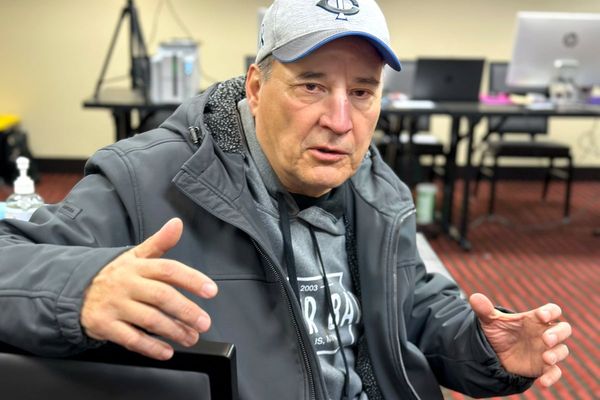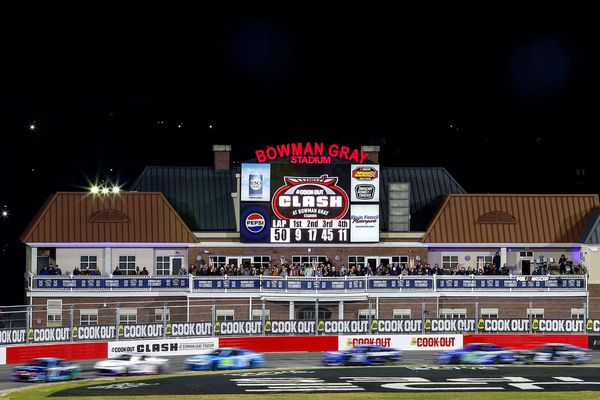
If you could use a tale of true love enduring in the face of tremendous obstacles, Skokie’s Northlight Theatre has you covered with “Dear Jack, Dear Louise.” Ken Ludwig’s warm, gently comedic World War II-set epistolary rom-com is a soft-focus balm that’ll have you rooting for both the Army medic and the aspiring showgirl of the title.
The long-distance couple are modeled on Ludwig’s own parents, who had a lengthy written correspondence during World War II before they ever met in person. Directed by Jessica Fisch, this two-hander follows Louise, an aspiring Broadway actress, and Jack, a doctor stationed at an Army base in Medford, Oregon. The plot is much sweeter and less farcical than Ludwig’s triple-Tony winning “Lend Me a Tenor,” but it retains the playwright’s sunny optimism throughout. This is comedy, not tragedy, so it’s not a spoiler to say that there is never much doubt but that Louise (Sarah Price) and Jack (Casey Hoekstra) will eventually overcome their obstacles.
Northlight’s production has a cast that sparks with live-wire chemistry (and repartee) that echoes the very movie stars referenced by the script: Jack has the quiet everyman dignity of nice-guy Jimmy Stewart; Louise has the deadpan/spitfire effect of Katharine Hepburn. Their banter has an engaging rhythm, no small task given that the characters are reading letters rather than interacting in person.
This might be a play that consists of people reading letters to each other, but it has the energy and the physicality of dynamic, in-person conversations. That’s thanks in large part to Fisch’s effective blocking, which often manages to put the pair physically close together while still conveying the great distance between them.
The two meet, at least on paper, after their parents act as long-distance matchmakers. As Jack pragmatically explains in his charmingly matter-of-fact introductory letter to Louise, their fathers know each other and apparently agreed that Jack should be urged to write Louise in order that the two might “meet and get acquainted in a social way.”
They start slowly, each prodding just enough to determine whether the other is worth pursuing further. Jack seems convinced there is absolutely nothing interesting to relay about his life. An exasperated Louise is taken aback when he finally mentions what he does in the Army: He’s a doctor. It’s a vocation that will take him from Medford to undisclosed locations on the Western Front, where the endless cycles of carnage will take an increasing toll.
Throughout, the couple’s attempts to meet in person are thwarted as the war grinds on and Louise’s career begins taking off.
Among the most affecting moments in “Dear Jack, Dear Louise” occur when the two lose track of each other completely, the tenuousness of their pen-and-paper link exposed in all its fragility. He can’t tell her where he is beyond “Europe,” she receives letters months after he wrote them, leaving his current whereabouts and well-being agonizingly murky. As Price and Hoekstra make clear, it’s a pressure cooker that makes mistrust and misunderstandings all but inevitable.
But comedy softens all edges here, and this cast knows how to deliver it. Price makes the utmost of a lengthy (but somehow not long enough) passage from “Arsenic and Old Lace,” as Louise prepares for an important audition. It’s a treatise on madness and a comedic high-wire act perfectly balanced between camp and absolute sincerity, and it is a stitch.
Hoekstra gets more than a few moments of existential angst when he bemoans humans’ apparent inability to not slaughter each other. He refers to D-Day with a quiet, almost bitter edge. It’s a gut-punch upon gut-punch as he bears witness to war crimes and carnage on an overwhelming scale.
But in the end, even the horrors of World War II fade in a flurry of confetti and a silhouette that evokes one of the most enduring images to come from V.J. Day. “Dear Jack, Dear Louise” is an ebullient, optimistic love story. Few people write actual letters anymore. Today, Jack and Louise would probably be emailing or texting. But as Ludwig makes clear, words — on paper or as pixels — can provide a rudder and a road map during times of global tumult.







